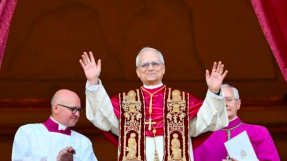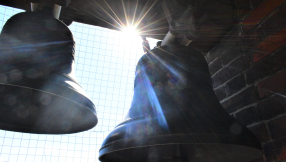US presbyterians remove gay condemnation from faith document
PC(USA) commissioners and delegates at their biennial General Assembly went into nearly seven hours of debate on overtures, or resolutions, that called for changes to the 1962 Miller-Osterhaven translation of the Heidelberg Catechism. Much of the controversy revolved around a reference to "homosexual perversion" that is not found in the original German text.
Written in the 16th century, the Heidelberg Catechism has been translated into many languages and the PC(USA) adopted in 1967 the Miller-Osterhaven version in its Book of Confessions. Opponents of the current translation say the original text and all subsequent translations do not contain any reference to homosexuality and are seeking for a more historically faithful and accurate translation.
Christopher Elwood and Amy Plantinga Pauw, who are part of 32 faculty members from the denomination's 10 seminaries who signed a petition calling for a better translation, said the current version misleads readers by adding phrases that suggest that the catechism took a clear stand on issues of sexual orientation and practice, according to the Presbyterian News Service.
Professor Edward Dowey, chair of the Special Committee of the General Assembly that oversaw the production of the Book of Confessions, acknowledged that he and the committee as a whole failed to notice these errors, and are in this respect "guilty of negligence", according to PNS.
Question 87 in the 1962 translation asks, "Can those who do not turn to God from their ungrateful, impenitent life be saved?
The reply states, "Certainly not! Scripture says, 'Surely you know that the unjust will never come into possession of the kingdom of God. Make no mistake: no fornicator or idolater, none who are guilty either of adultery or of homosexual perversion, no thieves or grabbers or drunkards or slanderers or swindlers, will possess the kingdom of God.'"
In support of the current version, Dr Robert AJ Gagnon of Pittsburgh Theological Seminary argues that the original German text alludes to the Scripture passage 1 Corinthians 6:9-10 which, in the New English Bible translation, lists "homosexual perversion".
"The spirit of the text of the Catechism is clear enough. It is the exact opposite of the attempt now being made to make the Confessions open to homosexual practice," Gagnon said in a written argument last week. "The attempt at retranslation is not about history and honesty but ideology and a homosexualist agenda."
Three professors - Bruce L McCormack, E David Willis, Michael D Bush - from Princeton Theological Seminary and Erskine Theological Seminary, issued a statement saying those proposing for changes fail to understand how the Book of Confessions function.
"It is not the Latin and German texts from the sixteenth century that guide our Church, but rather it is the English texts adopted by the deliberative assemblies of the Church and published in the Book of Confessions by which every officer of our Church has vowed to be guided," they said. "These English versions have been responsibly translated and carefully chosen as 'faithful expositions of what Scripture teaches us to believe and do'."
Other supporters of the current Heidelberg version also appealed to the church's longstanding condemnation of homosexuality, according to PC(USA)'s news service from the 218th General Assembly in San Jose, California.
The issue was first visited at the General Assembly in 1997 and then again in 1998. Recommendations for changes to the catechism were voted down. But this year, the Committee on Theological Issues and Institutions approved 33-26 to ask the 218th General Assembly of the PC(USA) to make changes to the 1962 version.
Meanwhile, William J Weston, a sociology professor at Centre College in Danville, Kentucky, believes no one even makes anything serious of what the Heidelberg Catechism says. He went further to say that the Book of Confessions has become merely advisory and is ignored, according to his blog post Tuesday.
Thus, he argues, "The whole Heidelberg translation issue is not really about changing a serious or effective part of the Presbyterian constitution. It is a symbolic feint in the ideological struggle over normalising homosexual practice."
"What the church really needs is a confession it actually confesses. Then we can have a serious discussion of how, exactly, it is worded," Weston added.













